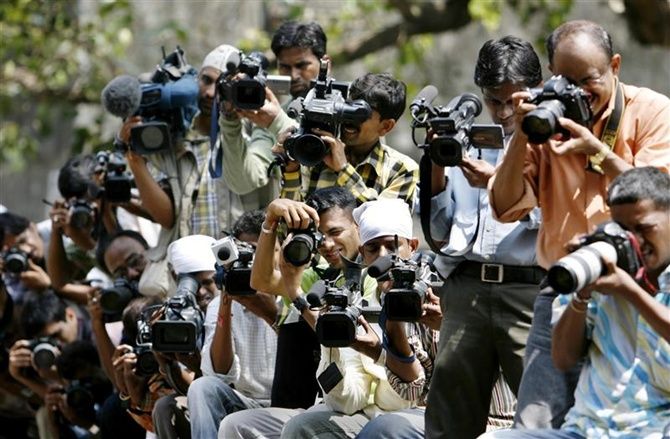 Many people share the concern about powerful business houses like Reliance buying into media, openly or in surrogate fashion, and the possible consequences, says TN Ninan.
Many people share the concern about powerful business houses like Reliance buying into media, openly or in surrogate fashion, and the possible consequences, says TN Ninan.
The Gandhis are fighting a court battle to clear their actions on Congress party money being used to finance National Herald, now defunct. A company controlled by the Gandhis will, it is said, revive the paper.
If the telecom regulator, who has come out with a whole set of recommendations on the media, has its way, the Gandhis will be stopped in their tracks, because it has recommended that politicians and political parties should not own the media.
So what will happen to People's Democracy, Deshabhimani and the TV channels that the Communists control in Kerala?
Since non-politicians may not want to run these, must they shut down? What about Dinakaran, the leading Tamil daily that is run by the Marans, who have been both politicians and publishers for decades?
And their massive Sun TV network?
Also, Sharad Pawar's brother and nephew have run a large Marathi newspaper, Sakal, for many moons; is that a surrogate for the Nationalist Congress Party, whose birth post-dates the paper?
In a country where the original Gandhi ran not one paper but two, and where both the Congress and the Muslim League had their different pre-Independence mouthpieces, the telecom regulator's recommendations fail the reality check.
Rahul Khullar, who is the chairman of the Telecom Regulatory Authority of India, is an intelligent man, and very public-spirited. He evidently shares the concerns of many, about recent trends in the media - its ownership, its practices and malpractices.
But he has got it all wrong when it comes to solutions.
Simply put, he wants to take a concept from the financial sector, of someone being considered by a regulator to be "fit and proper" to own a bank or a stock exchange, and extend it to the media world. When one surveys the media ownership scene, it is hard to see how this might work.
Among other things, there is the Constitutional protection to free speech that includes the right to propagate your views through a media outlet.
Recent abominations like paid news have nothing to do with the kinds of ownership that Mr Khullar seeks to ban. Indeed no major newspaper in any language has changed hands in recent years; almost all the big ones are family-controlled, not corporate-owned.
Some TV companies have changed hands because the entrepreneurs who started them got into financial hot water and had to bail out. If richer companies did not buy them, the TV channels would have shut down.
That may have reduced clutter, but it would also have reduced choice.
Many people share the concern about powerful business houses like Reliance buying into media, openly or in surrogate fashion, and the possible consequences. But if all "companies" are to be barred from owning media entities, should the media only be owned by charitable trusts?
Or are we fading into dreamland? The one ownership restriction one can agree on is that no government agency or surrogate should get into the media (no one wants more Doordarshans!).
Media regulation is slippery terrain, for a specific reason. As commercial enterprises they have legitimate financial objectives.
But the media are also public institutions because they provide a public good. How a media organisation should wear both hats has long been the tricky question, usually answered by the formulation that church and state should be kept apart.
That can happen only through internal conviction, and the tragedy is that long-established media owners (not new ones) blurred the lines a long time ago.
But here's the thing: most readers don't seem to care overmuch, and simply put a discount factor to what they read. Do we then get the media we deserve?









 © 2025
© 2025